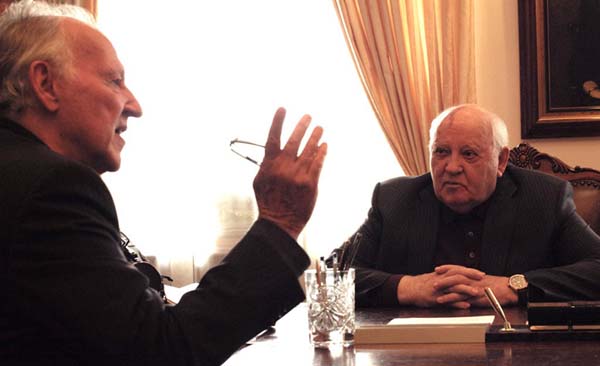5 May 2019
‘Meeting Gorbachev’ Review: Sitting Down With the Last Soviet Leader
Werner Herzog, left, and Mikhail S. Gorbachev in “Meeting Gorbachev.”
Credit The Orchard "Meeting Gorbachev"
NYT Critic's Pick
Directed by Werner Herzog, Andre Singer
Documentary
Geopolitics has never been high on Werner Herzog’s list of concerns, at least in his documentaries. Even when he glances toward current events (“Lessons of Darkness,” “Into the Abyss”), the thrust tends to be philosophical — his interests run more to quixotic quests and humanity’s insignificance in the vastness of nature. That makes him an odd fit to interview Mikhail S. Gorbachev, whose leadership of the Soviet Union helped bring the Cold War to an end.
Then again, if the moral of “Meeting Gorbachev,” directed by Herzog and André Singer, is that contemporary politicians have ignored the lessons of Gorbachev’s leadership, then perhaps the former Soviet president’s push for peace makes him right at home in Herzog’s gallery of underheralded visionaries. Herzog suggests to Gorbachev that the international mood is returning to a Cold War atmosphere. He replies, “I just wanted to say that Cold War cannot be a form of international relations. People who don’t understand the importance of cooperation and disarmament should quit politics.” (Subsequent to the film’s premiere last year, he criticized President Trump’s announcement of a withdrawal from the Intermediate-Range Nuclear Forces Treaty.)
The meat of the documentary consists of three sit-down interviews Herzog held with Gorbachev over half a year. Herzog begins by noting the cultural tension between them, given their home countries’ adversarial relationship in World War II. “The first German that you probably met wanted to kill you,” the filmmaker says, though Gorbachev denies it. The two men appear to like each other immensely — in narration, Herzog calls Gorbachev “one of the greatest leaders of the 20th century” — but Gorbachev can be a cool customer. He sometimes seems guarded in his assessment of what he might have done differently. He says he believes the Soviet Union should have given its republics more rights instead of dissolving entirely. As for Boris Yeltsin, who became the first president of a post-Soviet Russia, he says, “I should have sent him off somewhere.”
But if “Meeting Gorbachev” finds its subject mostly staying on a pro-peace, antinuclear message — and it’s a script that’s hard to argue with — Herzog shapes the film into a study in how world events often come down to quirks of character and circumstance. To another leader, glasnost or perestroika would not have seemed like obvious policies. A thaw might never have happened.
In a rundown of Soviet history before Gorbachev’s ascent, Herzog turns the successive funerals of the much older Soviet heads of state who preceded him into a grimly humorous recurring joke. (Leonid Brezhnev, Yuri Andropov and Konstantin Chernenko all died within a three-year period.) Herzog suggests that even before his rise, Gorbachev was different in style from other Soviet leaders. Miklos Nemeth, who was prime minister of Hungary starting in 1988, says that when Gorbachev came to study Hungary’s agriculture, he was all business, with no interest in favors.
Now 88, Gorbachev is still pithy, clear and direct in his answers. Herzog seems less in his element as an interviewer than he is when parsing historical footage, including musing on a brief handshake between Gorbachev and Reagan at their 1986 summit in Reykjavik. Herzog is particularly interested in Gorbachev’s legacy in Germany, where — according to the director — he is revered for allowing the country’s reunification to happen peacefully.
Gorbachev pushes back at the notion that the Soviet Union’s end was somehow a triumph for the other side. “Americans thought they’d won the Cold War, and this went to their heads,” he says. “What victory? It was our joint victory. We all won.” Well, maybe not entirely — Vladimir V. Putin, pointedly absent from most of the film, is glimpsed in footage of Raisa Gorbachev’s funeral — but you come away from the movie agreeing with Herzog’s assessment, and yearning for Gorbachev’s brand of diplomacy.
|
|
The XXI century will be a сentury either of total all-embracing crisis or of moral and spiritual healing that will reinvigorate humankind. It is my conviction that all of us - all reasonable political leaders, all spiritual and ideological movements, all faiths - must help in this transition to a triumph of humanism and justice, in making the XXI century a century of a new human renaissance.
|
|
Русский |





